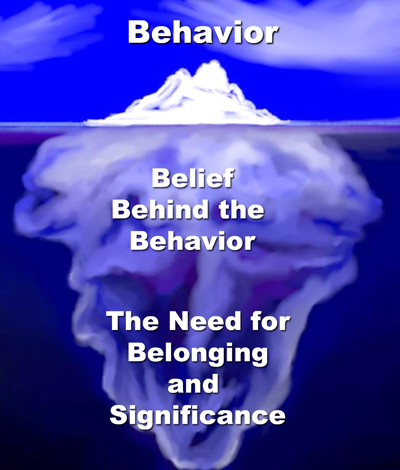Excerpt from Positive Discipline Parenting Tools Book
by Jane Nelsen, Mary Nelsen Tamborski, and Brad Ainge
The majority of discipline models practiced in homes and schools today are based on punishments and rewards. Positive Discipline is based on the Adlerian model of eliminating all punishment and rewards in favor of encouragement that addresses the basic needs of children to belong and feel significant. Our task is to help children find belonging and significance in socially useful ways.
We begin by understanding and addressing mistaken beliefs of children. A child’s behavior, like the tip of the iceberg below, is what you see. However, the hidden base of the iceberg (much larger than the tip) represents the belief behind the behavior, and the child’s deepest need for belonging and significance. Most parenting programs address only the behavior. Positive Discipline addresses both the behavior and the belief behind the behavior.

When children misbehave, they usually have a mistaken belief about how to gain a sense of belonging. The belief generates what parents call misbehavior. Most parents react to the behavior with some kind of punishment (blame, shame, or pain). This only confirms a child’s belief that he or she doesn’t belong, creating a vicious cycle.
Alfred Adler and Rudolf Dreikurs taught that a misbehaving child is a discouraged child. The discouragement comes from the belief “I don’t belong.” In most cases, this is shocking to parents. They wonder, “How can my child believe she doesn’t belong? How could she not know how much I love her? This doesn’t make sense.” Aha! You have now entered the realm of one of life’s greatest mysteries. How and why do children create their beliefs—especially when they don’t make sense to us? This is why it is so important to get into the child’s world to understand the child’s “private logic.” We all have our unique way of perceiving the world, yet sometimes parents forget that their children perceive the world differently than they do.
When children feel discouraged, they compensate through seeking Undue Attention, using Misguided Power, seeking Revenge or giving up through Assumed Inadequacy (see the Mistaken Goals chart). Once we recognize this, it helps us understand the importance of using tools that invite children to feel connected, empowered, respected and encouraged. If we can help change the discouraged belief underlying the behavior, it is more likely the behavior will also change.
Some parents have thought that Positive Discipline implies a positive way to use punishment. Actually, we don’t believe in punishment at all. In addition, we don’t believe in praise, punitive time-out, taking away privileges, or rewards. The Positive Discipline tools show how many discipline methods there are that do not include rewards or punishment. Research shows that punishment and rewards are not effective in the long term and in fact negatively impact things such as self-regulation, intrinsic motivation, and the quality of family relationships. We even discourage the use of logical consequences—at least most of the time. The reason for this is our discovery that many parents try to disguise punishment by calling it a “logical consequence.”
Following is a list of beliefs that are likely to be created by punishment.
THE 4 R’S OF PUNISHMENT
- Resentment: “This is unfair. I can’t trust adults.”
- Rebellion: “I’ll do just the opposite to prove I don’t have to do it their way.”
- Revenge: “They are winning now, but I’ll get even.”
- Retreat:
- Sneakiness: “I won’t get caught next time.”
- Reduced self-esteem: “I am a bad person.”
Some people think this leaves only one alternative—permissiveness, which can be just as damaging as punishment. Permissiveness invites children to develop the belief that “Love means I should be able to do whatever I want,” or “I need you to take care of me because I’m not capable of responsibility,” or even “I’m depressed because you don’t cater to my every demand.”
“So,” you may ask, “if not punishment and not permissiveness, then what?” The answer is encouragement. Positive Discipline is an encouragement model. Since a misbehaving child is also a discouraged child, Dreikurs taught that a child needs encouragement the way a plant needs water. All of the tools we share with you are encouraging to children, as well as to parents. They are designed to increase a sense of belonging and significance, and thus they focus on the belief behind the behavior. To be more specific, they meet all five of the criteria we’ve listed as essential to Positive Discipline.
FIVE CRITERIA FOR POSITIVE DISCIPLINE
- Helps children feel a sense of connection, belonging, and significance.
- Is kind and firm at the same time.
- Is effective long term.
- Teaches valuable social and life skills for good character, fostering respect, concern for others, problem solving, and cooperation.
- Invites children to discover how capable they are, and how to use their power constructively.
It helps to be very clear about what you hope to achieve with children. Parents play a crucial role in the development of a child’s personality and greatly influence children’s overall well-being. Different parenting styles have been linked to a variety of specific developmental outcomes related to social and emotional well-being as well as academic achievement. Numerous studies show a direct correlation between parenting style and levels of self-regulation, overall life satisfaction, grades, alcohol use, aggression, and oppositional behavior.
All of the Positive Discipline tools are designed to help parents practically apply what is well identified in the research as most beneficial for family relationships and child development.

